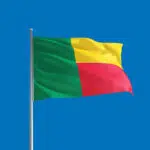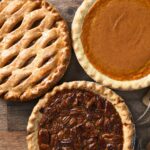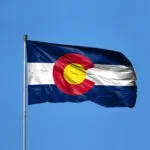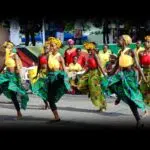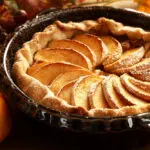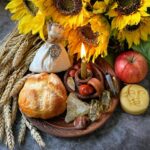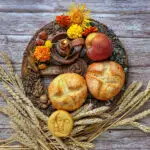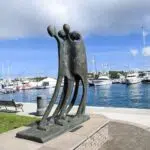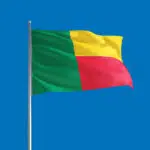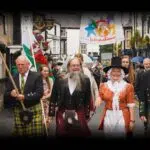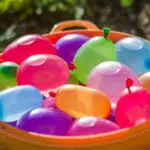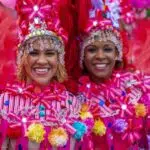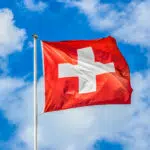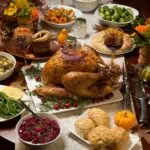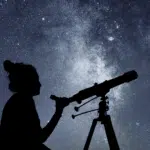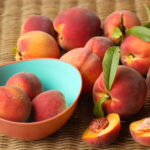Lughnasadh, celebrated annually on August 1, is a Gaelic festival observed by the Irish, Scottish, Manx, Celtic neopagans, and Wiccans to mark the start of the harvest season. ‘Lugh,’ a mythical Irish god, is said to have created Lughnasadh to honor his foster mother ‘Tailtiu.’ Like the ancient Olympic Games, this festival featured sporting contests, music, storytelling, law proclamations, horse riding, trading, and trial marriages. In modern times, Lughnasadh is a celebration of the harvest season and has been Christianized — in some places, a pilgrimage to the top of ‘Croagh Patrick’ takes place on Reek Sunday.
History of Lughnasadh
‘Lughnasadh’ comes from ‘Lugh,’ an Irish god, and ‘nasad,’ which means ‘assembly.’ In Irish mythology, Lugh created Lughnasadh as a funeral feast and athletic competition in honor of his mother ‘Tailtiu,’ who died of exhaustion after clearing the plains of Ireland in preparation for farming. Lugh, a prominent mythical Irish god, is often portrayed as a warrior, king, master craftsman, and savior.
“The Festival of Lughnasa,” written in 1962 by Máire MacNeill, gives a comprehensive account of Lughnasadh folklore in ancient times. Its theme is a struggle for the harvest between Lugh and Crom Dubh, another mythical god who stores the grain, which Lugh seizes for humanity. Often, this is portrayed as a struggle for ‘Eithne,’ a woman who symbolizes the grain. Also, Lugh combats and destroys another figure representing blight. ‘Óenach Tailten’ or ‘Aonach Tailteann’ was a ceremony held during Lughnasadh in commemoration of Tailtiu. Sporting contests that were similar to the ancient Olympic Games, music, storytelling, law proclamations, horse riding, trading, and trial marriages took place in this festival.
Towns in Ireland still hold Lughnasadh festivals, which feature dancing, music, storytelling, and arts and crafts. Although many Lughnasadh practices survived the modern era, some underwent a Christian conversion. For example, Reek Sunday, a very popular pilgrimage in late July whereby pilgrims climb to the top of Croagh Patrick mountain, and the Puck Fair in August, which holds in Killorglin, County Kerry, are linked to ancient Lughnasadh practices. Lughnasadh is spelled as ‘Lúnasa’ in modern Irish, which also stands for August.
Lughnasadh timeline
The Anglo-Saxon Chronicle mentions Lughnasadh as the feast of ‘first fruits.’
A version of the Irish legend of “Tochmarc Emire” records Lughnasadh festivities.
Records of Lughnasadh customs increase.
Máire MacNeill publishes “The Festival of Lughnasa.”
Lughnasadh FAQs
Who did Lugh marry?
Lugh had several wives — Bui, Buach, Echtach, Englic, Rosmerta, and Nas are the most commonly mentioned.
What’s Lugh god of?
Generally, the deity Lugh’s depicted as the god of the sun and light in Irish mythology.
Who killed Lugh?
Lugh died at the hands of the three sons of his wife’s lover, Cermait, whom he killed. They drowned Lugh after spearing him through the foot.
Lughnasadh Activities
Participate
If unable to attend physically, participate virtually by joining an online platform and streaming a live video of the Lughnasadh festival. There’s nothing quite like celebrating from the comfort of your own bed.
Learn more
There’s plenty to learn about this beautiful Gaelic festival and the people who celebrate it. Gain more knowledge about Lughnasadh by learning as many facts as possible.
Go hiking
In modern times, many people celebrate Lughnasadh by hiking to mountain tops, which is also good exercise. Don’t be left out! Hike to the top of a hill or mountain in your area.
5 Interesting Facts About Lugh
Lugh is fair to behold
Often, Lugh’s depicted as a strong and handsome young warrior.
‘Lamfada’ means ‘long hand’
Lugh’s primary epithet is ‘Lamfada,’ meaning ‘long hand.’
Lughnasadh is also Lammas
Lughnasadh is also called ‘Lammas,’ which means ‘loaf mass.’
Multi-talented
He is associated with skill and mastery in multiple disciplines, including the arts.
Lugh has other spellings
Lugh is known as ‘Lug’ in Old Irish and ‘Lú’ in modern Irish.
Why We Love Lughnasadh
Lughnasadh commemorates history
Lughnasadh is a reminder of Gaelic history and customs. It paints a beautiful picture of long-standing culture and traditions.
Lughnasadh celebrates Gaelic customs
Lughnasadh is a Gaelic festival practiced by Gaels in Ireland, Scotland, and the Isle of Man. It unites Gaelic people everywhere.
Lughnasadh promotes tourism
Spreading awareness about Lughnasadh fosters tourism in places it is celebrated. Tourist presence ultimately boosts the local economy.
Lughnasadh dates
| Year | Date | Day |
|---|---|---|
| 2025 | August 1 | Friday |
| 2026 | August 1 | Saturday |
| 2027 | August 1 | Sunday |
| 2028 | August 1 | Tuesday |
| 2029 | August 1 | Wednesday |





